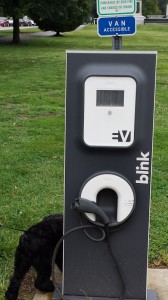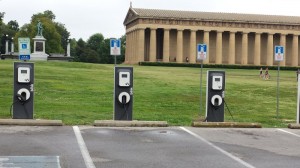The images above are courtesy of a colleague who recently went to Nashville, TN. They depict publicly available electric vehicle charging stations in public parking lots. Many new technologies, such as electric vehicles, beg the question of “Which comes first the chicken or the egg?”
This is where we would like your feedback, as we muscle through the regional financially constrained multimodal long-range transportation plan (CLRTP 2040) planning process. Should we plan for and anticipate providing infrastructure, such as electric vehicle charging stations, before there is a critical mass of ownership in or region? Or should we wait?
Other aspects of this question to consider are:
- What about travelers and tourists? Would providing charging stations attract electric vehicle owners to visit the Roanoke Valley?
- Is there a branding effect? If we become known for this type of cutting edge infrastructure does the positive PR compensate for the costs?
- Is there a negative branding effect? If electric vehicles don’t take hold quickly would this be seen as a boondoggle?
- Is this a “leadership by example” type of situation?
- Can the private sector be counted on to provide infrastructure in anticipation of market demand?
- Are there other technologies on the horizon?
- Other?
We need you feedback on all of the above and other aspects of this question. Please don’t be shy add your feedback in the comment section.
[google-translator]



As an owner of an EV and a wife that has a PHEV as well as working for an MPO that deals with air quality (we are non-attainment) I can give you some unique insights:
While any EV charging is done mostly at home, more infrastructure DEFINTITELY brings more buyers. Most people have a hard time driving their EVs down to the last few miles (range anxiety), and these are really “peace of mind” and do help extend the range of EVs. Live in a very large spread metro area, I cannot go across and back without public charging, and may times I need to. More stations drive up ownership. I will say most BEV owners try and not rely on public charging because of the instability and unreliable nature, but PHEVs used them more because they can always use gas, but electricity is cheaper.
I will say that public charging has definitely decided my choices of places to visit. I have gone out of my way to places just because they had public chargers and tried new destinations I never had before. You will attract a small amount of people to visit because of that, but I think its a more localized effect.
I think this can only be a positive PR effect. Both sides of the political scale support EVs (or should in theory). Its either green for the environment and air quality or its defending our nation and preventing our demand of foreign oil and using military to enforce that.
You may get some negative feedback, but its going to be by a very few people most whom are not educated about plug-ins in general. With as much momentum and commitment for plug-ins, I don’t see them going anywhere.
This is definitely leadership by example. Set the example and others will want to follow suite, but you will be the first and have the best system.
Hmmm the private sector. Its a yes and no. They are the main driver in providing these stations, but you need some government backbone to it. As of right now, its just whatever business wants it (and will pay for it) installs it. Sometimes you have places installing them that really aren’t going to be used (convenience store, etc.). This neglects the most common uses (work places, malls, and shopping centers). Not that these stations are helpful, but sometimes a focus of targets is needed (gov incentive to install). In addition, the biggest hurdle is the unreliability of the public charging. How can I rely on the system if stations are non-operational or blocked by regular vehicles (super common since any map will show these stations available to use). A strong public support such as no parking unless charging, etc. is really needed. I can’t count how many times I have seen regular vehicles taking these spots as I limp to find another station desperately.
The only tech that could ultimately be a factor is a larger battery for these cars. If prices come way down and range increase significantly, then these stations are not needed as much. But a sub 20k “gas range” vehicle (for some reason the public wants 350-400 miles) is a long way off. Hydrogen is just not viable. Infrastructure is required (not supplemental) and expensive. Hydrogen production produces more pollution and is less efficient than electricity and only carries a fraction of the energy density (its a energy carrier). So hydrogen will always be a less efficient system (energy wise in BTUs), cause more pollution (either how hydrogen is produced or the transportation of hydrogen), and the infrastructure is insanely expensive (and vehicles are more expensive as well). Hydrogen is mostly hype that won’t become as common as EVs
Thank you for your insightful feedback. We don’t often hear from EV owners who work at another MPO. Thanks for contributing to the conversation and our MPO’s public outreach and social media efforts.
This just came across the wire about Virginia Beach considering electric charging stations:
http://www.dailypress.com/business/tidewater/dp-virginia-beach-looks-into-electric-vehicle-charging-stations-20140827,0,1723246.story
There is movement in the Hampton Roads area on this. Newport News offers 12 charging stations in parking garages.
http://www.dailypress.com/news/newport-news/dp-nws-car-chargers-20140902,0,7996619.story
Here is an update about a new rapid charging station in Downtown Roanoke:
http://www.roanoke.com/news/local/roanoke/with-downtown-charging-station-roanoke-empowers-electric-vehicle-owners/article_db2e9b8e-c985-51e8-b04b-68b0f2726a00.html